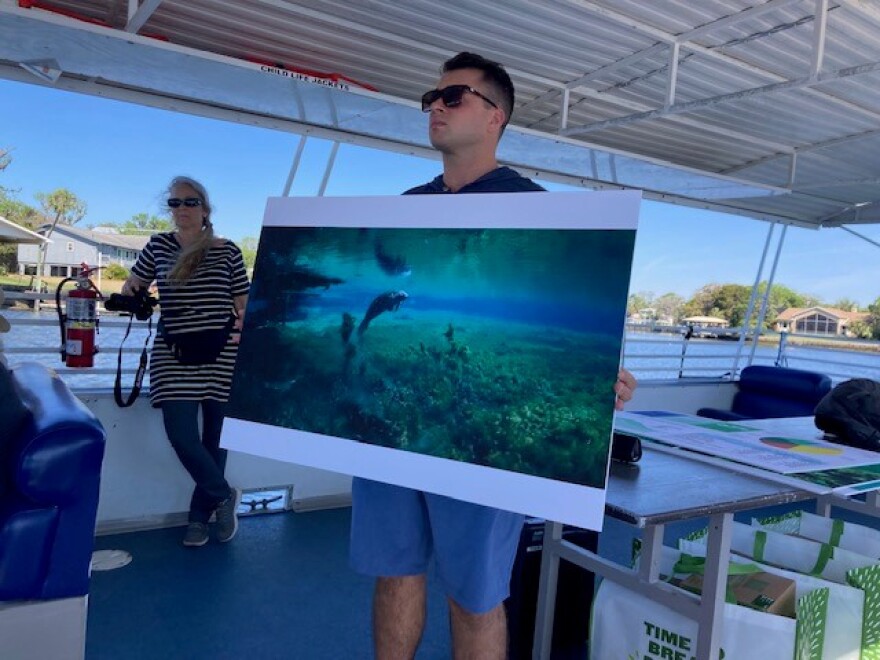From atop a pontoon boat, you can see that Three Sisters Springs is a postcard picture of idyllic Florida. Swimmers float on foam noodles above manatees munching on seagrass in the clear water.
The three crevasses where the underground aquifer flows into Crystal River are shaded a deep blue. But just a few feet away, the waters start to sport a tinge of green.
As in algae green.
“You notice the water is kind of dusty and brown,” said Capt. Mark Denzer, our pilot on a recent spring day. “That's because every time a manatee swims by, every time a fish swims by, a bird swims by, it creates that dust, because the grass isn't holding it down. So once we remove it, the rest of the ecosystem has to recover from it.”
Denzer says what causes the problem is a lack of seagrass – it was killed by pollution and Hurricane Helene's storm surge.

“When I first started, Kings Bay was this dirty every day,” Denzer said. “Over the course of eight years, I watched the grass start out up in Hunter Springs and slowly spread across the bay before (hurricanes) Idalia and Helene came in.
“Right now, we're in about 6 feet of water,” he said, pointing into the murky bay. “If you looked down, you would see a blue crab down there. That's how clear the water was. There'd be 3 feet of grass. It was gorgeous. The hurricanes knocked us back. We're going to test the resiliency of it.”
ALSO READ: Development is taking a toll on Florida's precious springs
With 71 spring vents, Kings Bay is the second largest freshwater spring system in Florida and one of the largest in the nation.
Nitrogen and phosphorous from septic tanks and lawn fertilizer spawn the growth of algae. That smothers the eelgrass that is one of the anchors of the food chain for marine life, including Crystal River's famous manatees.
People like Michael McGrath are hoping the state will take action.
“Having blue springs and green lawns – these goals are not mutually exclusive,” said McGrath, with the Sierra Club of Florida.

He helped organize this tour to help stop overpumping of groundwater that sucks up almost a third for the springs’ historic flows. And he's pushing summertime bans on lawn fertilizer. Citrus County, where Crystal River is located, has a winter ban but is considering one during the rainy summer months when runoff enters the springs.
Eighteen Florida counties – including Hernando, Hillsborough, Pinellas, Manatee and Sarasota – have similar bans. Hundreds of cities have them. But Ryan Smart of the Florida Springs Council says that's only part of the solution.
“When you look at where the pollution comes from here in Crystal River, it's largely urban. It's primarily septic tanks, and it's primarily urban fertilizer,” he said.
Gov. Ron DeSantis has proposed $50 million in grants this upcoming fiscal year for springs protection. That includes about $5 million to convert septic tanks to sewers around Weeki Wachee Springs in Hernando County.
Smart says that's a drop in the bucket.
"“If you mess up our waterways, you're going to mess up our economy.”Michael McGrath
“At that rate, we're never going to be able to make a real, meaningful difference.” he said. “And we can do projects, and that's great, and they're doing projects, but the extent of the number of projects that have to be done and the cost to removing those septic tanks means, if that's going to be the solution, we need a lot more money coming from Tallahassee.”
McGrath said it's not just helping out swimmers and kayakers who flock to see the manatees. Having clean water makes good business sense for the entire state.

“I think something really important to remember, that the environment is the economy here in Florida,” he said. “Look around us right now. You see all these different charter boats, all these different folks going out doing manatee viewing here in the winter months. In the summer months, people come out here scalloping. Having good clean water helps increase property values. It's just good for the economy of Florida.
“If you mess up our waterways, you're going to mess up our economy.”
Improvements can't come soon enough for Maxine Conner. She's active in the Sierra Club Adventure Coast, which includes Citrus and Hernando counties. Maxine has been coming to Crystal River since the late 1970's – and the changes have been drastic.
“It was crystal clear. It was just absolutely amazing. When I moved up here in 2012, I was horrified when I finally came out here on the bay to see the changes,” she said. “What my concern is that the growth we're experiencing here, so many things are coming through the planning department, so much growth is getting set up here. All the problems we have now are just going to get exacerbated. That's why I'd like to see our county look at the fertilizer ordinance and try to make it better, to reduce the nutrients going into the springs and rivers.”
And what did she feel when she moved back here?
“Sadness. It's a shame, because it was a magical experience.”
Recapturing that "magic" will take a lot of time – and a lot of money.







